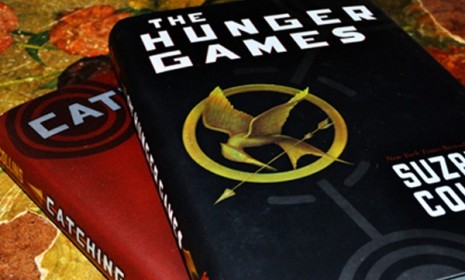Is The Hunger Games corrupting kids?
Has young-adult fiction become harmfully dark as a whole — or have teens always had to sift through subpar books to find enduring literature?

A free daily email with the biggest news stories of the day – and the best features from TheWeek.com
You are now subscribed
Your newsletter sign-up was successful
Young adult fiction has gradually become "rife with explicit abuse, violence and depravity," argues critic Meghan Cox Gurdon in The Wall Street Journal, a change that is negatively affecting teens' and children's behavior and increasing the need for parents and publishers to police amoral content. Perhaps proving her point, "hyper-violent" books like The Hunger Games trilogy, about a government that forces its teenage citizens to fight to the death in a nationally broadcast competition, have become bestsellers. Yet the overwhelming response to Gurdon's editorial from Twitter, literary columnists, and, most tellingly, the matriarch of YA fiction Judy Blume is that she is wrong. Have young adult novels become too dark, or should Gurdon just lighten up?
Yes, there is darkness. But it's "not all doom and gloom": While there is a "glut" of dark young adult books, most of the themes they tackle "reflect the times we're in," says Josie Leavitt at Publishers Weekly. Gurdon blasts parents and publishers for allowing "misery into their children's lives" through YA literature, but where, Leavitt wonders, "are the booksellers, the librarians in this woman's argument?" Any such expert "worth his or her salt" would be able to recommend books that "counter the gloom" on which Gurdon is fixated.
"Young adult fiction is not all doom and gloom"
The Week
Escape your echo chamber. Get the facts behind the news, plus analysis from multiple perspectives.

Sign up for The Week's Free Newsletters
From our morning news briefing to a weekly Good News Newsletter, get the best of The Week delivered directly to your inbox.
From our morning news briefing to a weekly Good News Newsletter, get the best of The Week delivered directly to your inbox.
"Do we really have to have this argument again?": By holding today's darkest YA literature against the standard of enduring classics by Judy Blume, Gurdon is presenting an "unfair and highly loaded argument," says Mary Elizabeth Williams at Salon. Yes, the YA section of bookstores isn't entirely stocked with great literature, but when was that ever the case? "Critics like Gurdon are forever holding the dregs of the present up against the best of the past." Smart kids have always sifted through the "trash" and discovered the "transformative power of books."
"Has young adult fiction become too dark?"
Twitter has spoken. #YASaves: Twitter-users rallied against Gurdon's editorial using the hashtag #yasaves, recounting stories of how YA literature has literally "saved" lives. Beneath the surface of the "angry hashtaggery," however, says Macy Halford at The New Yorker, it's clear that both sides in this argument want the same outcome: "For young readers to have encounters with literature that will positively affect their lives."
"#YAsaves: A tale of hashtaggery"
A free daily email with the biggest news stories of the day – and the best features from TheWeek.com